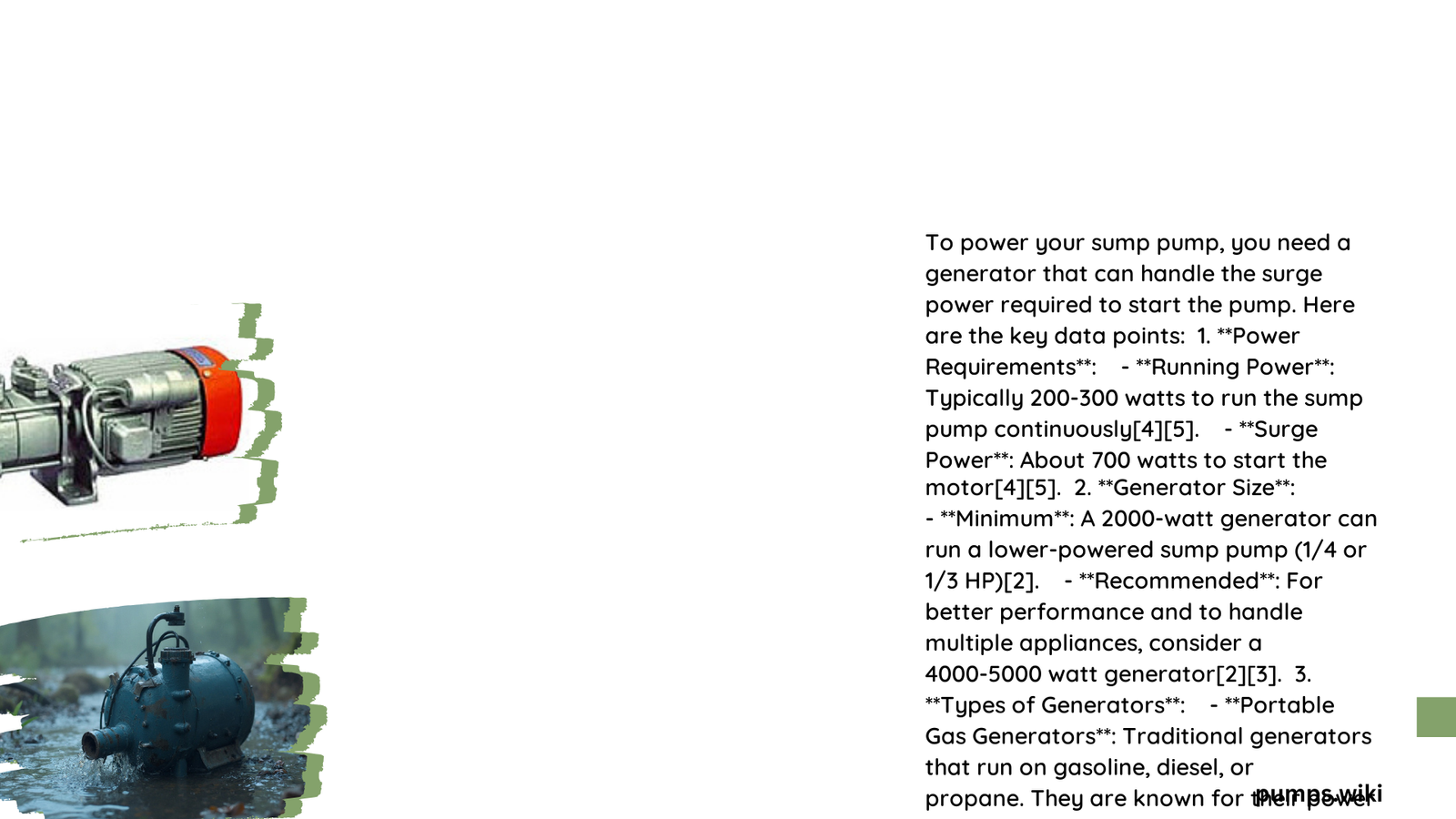When facing potential basement flooding, homeowners urgently seek reliable power solutions for their sump pumps. Understanding generator requirements is crucial for protecting your property during power outages. This comprehensive guide will walk you through selecting the right generator, considering wattage needs, power output, and specific sump pump models to ensure continuous water removal and home safety.
What Determines Sump Pump Power Requirements?
Sump pump power requirements vary based on several critical factors:
Horsepower and Wattage Breakdown
| Sump Pump Size | Running Watts | Starting Watts |
|---|---|---|
| 1/4 HP | 550-600 W | 1100-1200 W |
| 1/3 HP | 800-900 W | 1400-1800 W |
| 1/2 HP | 1000-1050 W | 2150-2900 W |
| 1 HP | 2000 W | 4100 W |
Why Starting Watts Matter?
When you need a generator to power your sump pump, understanding the difference between running and starting watts is crucial. Starting watts represent the initial surge of electricity required to activate the pump’s motor, which can be 2-3 times higher than continuous running watts.
How to Calculate Generator Size for Sump Pump?

To determine the right generator, follow these strategic steps:
- Identify Sump Pump Specifications
- Check manufacturer’s documentation
- Measure current horsepower rating
-
Note exact wattage requirements
-
Select Generator with Adequate Capacity
- 1/4 HP Pump: 2000-3000W generator
- 1/3 HP Pump: 3000-3500W generator
- 1/2 HP Pump: 3500-5000W generator
- 1 HP Pump: 5000-6000W generator
What Are Top Generator Recommendations?
Portable Generator Options
- EcoFlow DELTA 2 Max
- Power Output: 2400W running
- Surge Capacity: 4800W
- Ideal for: 1/3 and 1/2 HP sump pumps
- Battery Capacity: 2048Wh
-
Price Range: $2,000
-
Westinghouse iGen4500
- Power Output: 4500W peak
- Continuous Power: 3700W
- Fuel Type: Gas-powered
- Price Range: $600
- Best for: Larger sump pumps and multiple appliances
Battery vs. Gas Generators
| Generator Type | Pros | Cons |
|---|---|---|
| Battery Powered | Silent, Zero Emissions | Limited Runtime, Higher Cost |
| Gas Powered | Higher Power Output | Noisy, Fuel Dependent |
What Challenges Should You Anticipate?
- Noise Levels: Gas generators produce significant sound
- Fuel Management: Requires consistent fuel supply
- Weight and Portability: Heavier models might be challenging to move
- Runtime Limitations: Consider fuel efficiency and battery capacity
Pro Tips for Generator Selection
- Always purchase a generator with 20-25% more capacity than calculated needs
- Invest in pure sine wave inverters for sensitive electronics
- Consider automatic transfer switches for seamless power transition
- Perform regular maintenance on both pump and generator
Maintenance Recommendations
- Test generator monthly
- Keep fuel stabilized
- Check oil levels
- Store in dry, accessible location
- Replace worn components promptly
Final Considerations
Selecting the right generator requires careful evaluation of your specific sump pump’s requirements, budget, and potential emergency scenarios. Prioritize reliability, power capacity, and compatibility to ensure continuous basement protection.
Reference:
– VTOMAN Generator Guide
– EcoFlow Sump Pump Power Solutions
– Generator Mechanics Detailed Guide
